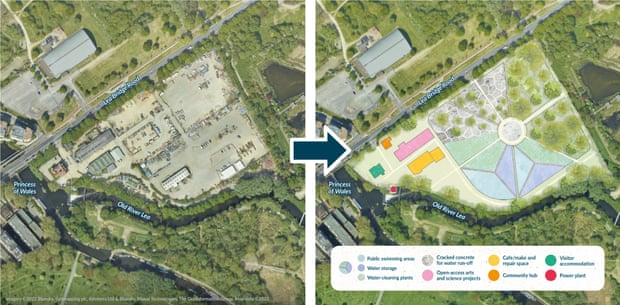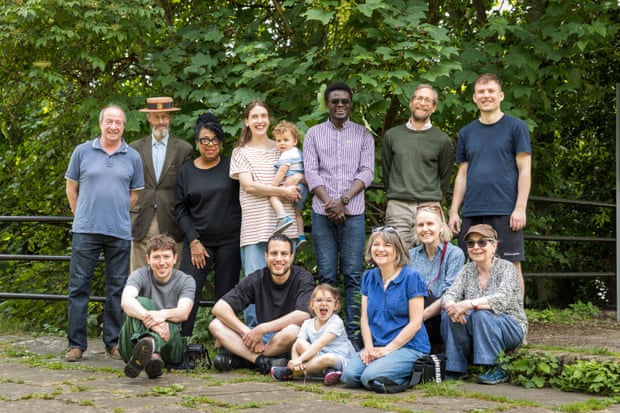
A concrete-covered, brownfield industrial storage site does not scream out wild swimming haven. But a community group is hoping to transform the east London plot – currently used by Thames Water – into what is believed to be the capital’s first new wild swimming ponds since Hampstead Ponds were created in 1777.
Under the proposed plans, residents want to buy the government-owned 5.68-hectare site on the polluted River Lea in Waltham Forest and turn it into a “brownfield rainforest”, featuring two free-to-use pools, community spaces, an anaerobic digester, a cafe and a make-and-repair hub.
East London Waterworks Park’s two ponds, measuring around 1,600 sq metres and 1,400 sq metres, would be fed by rainwater cleaned by reed beds and aquatic plants, and the site would run on hydro and solar power, and have a capacity of 1,000 people a day. “There’s a real desire to swim in open water to reconnect with nature, and there just isn’t enough capacity at the moment to respond to that desire,” said the chair of the project, Abigail Woodman, who works in educational publishing.
The idea came from members of the community after government plans to build two free schools on the site, which they purchased from Thames Water, fell through. Following a public meeting three years ago, swimming fast became a popular idea. “For the community, this is about embodying hope, because it can feel pretty bleak what’s going on at the moment,” said Woodman.
“This is about saying we can make things better, we do have the capacity and the power to do that if we come together and work hard.”
Amid record temperatures and drought, this summer has seen demand for wild swimming continue to soar following rising interest during the pandemic. But with pollution warnings and limited capacity in a small number of dedicated locations, particularly in cities, plus entry fees, the options are limited.
William Upton, chair of the City of London Corporation’s Hampstead Heath management committee, said “a record number of swimmers” have been using the Mixed Bathing Pond, Highgate Men’s Bathing Pond and Kenwood Ladies’ Bathing Pond, which each regularly draw more than 1,500 swimmers a day. The ponds were originally created in the 17th and 18th centuries as reservoirs before some were later turned into bathing pools.
Other wild swimming sites, West Reservoir in Hackney and Beckenham Place Park lake in Lewisham, have since opened, but the new project believes its ponds will be the first created in centuries.
So far, residents have raised more than £210,000 in crowdfunding in just a few weeks. The target is £500,000 by 28 October if the project is to progress to the next stage. Providing the purchase goes through and relevant planning permission is given, it is hoped the ponds will open to volunteers in 2027 and to the public two years later.
With a child poverty rate of more than 42% in Waltham Forest, making the facility free to use is a vital aspect of the project.
“We will divorce our ability to bring income and make sure that we can sustain the site from its usage so that it is open and inclusive to all,” said Woodman. “So a world run for people and nature.”
As well as bringing positive associations with physical and mental health, the ponds would also draw attention to water use at a time of dwindling supplies by displaying real-time data on how they use water.
“It’s very easy when you live in a city to be divorced from what is going on with our water supply,” said Woodman. “The water companies are saying we’re low on water. but it’s still coming out of the tap.”
Ed Accura, co-founder of the Black Swimming Association (BSA) and producer of the Blacks Can’t Swim documentaries, said the project would be a positive addition to the area, but that to many people, swimming does not feel “relatable”. Research by Sport England found that 95% of Black adults and 80% of Black children in England, and 93% of Asian adults and 78% of Asian children, do not swim.

Calling for education on water safety to be a top priority, he said that more than 100 people have so far taken part in the BSA’s water orientation and familiarisation pilot programme in Hackney, and there are plans to extend it around the country.
Accura, 56, who grew up in Tottenham, said that a few years ago he would have been “totally indifferent” to the creation of new wild swimming ponds. When he first got into a pool he felt fear. “Since then, I’ve been learning how to swim, getting more accustomed to getting into water. I feel relieved.”
Woodman said the project plans to work with young people to create a water safety campaign targeted at their peers. The scheme has the support of Shirley Rodrigues, London’s deputy mayor for environment and energy, who said it was an “excellent example of community-led action”.
She said the mayor, Sadiq Khan, is “committed to bringing nature closer to Londoners and rewilding the city by protecting, restoring and improving its green and blue spaces… It is essential that proposals like this enhance the local area and that, in creating new parks and open spaces, we are helping to build a better London for everyone.”
The Department for Education, which is understood to be responsible for the site’s sale, and Waltham Forest council said they were unable to comment on the proposed plans at this stage.
Thames Water, which met East London Waterworks Park in July, said it is “keen to support all stakeholder groups who want to develop wild swimming areas”.



